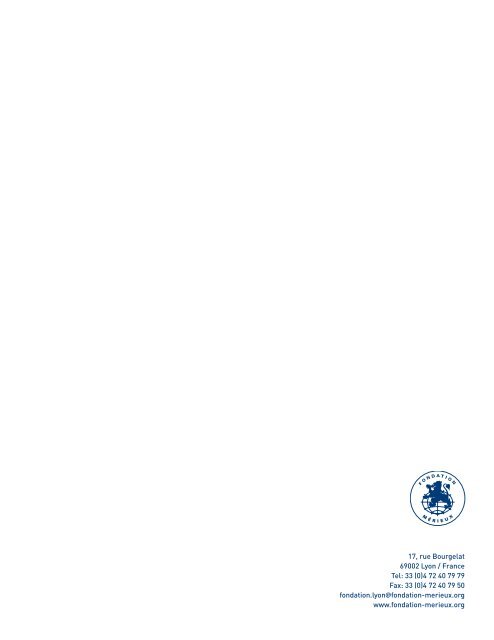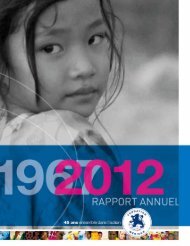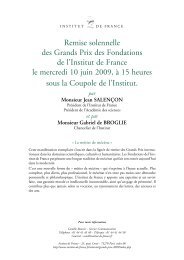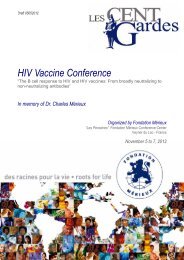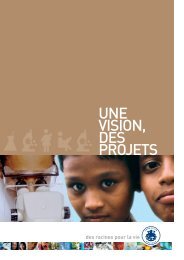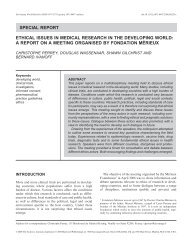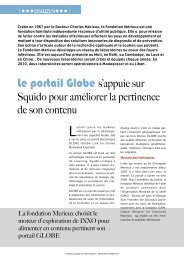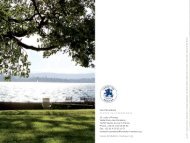17, rue Bourgelat 69002 Lyon / France Tel - Fondation Mérieux
17, rue Bourgelat 69002 Lyon / France Tel - Fondation Mérieux
17, rue Bourgelat 69002 Lyon / France Tel - Fondation Mérieux
Create successful ePaper yourself
Turn your PDF publications into a flip-book with our unique Google optimized e-Paper software.
<strong>17</strong>, <strong>rue</strong> <strong>Bourgelat</strong><br />
<strong>69002</strong> <strong>Lyon</strong> / <strong>France</strong><br />
<strong>Tel</strong>: 33 (0)4 72 40 79 79<br />
Fax: 33 (0)4 72 40 79 50<br />
fondation.lyon@fondation-merieux.org<br />
www.fondation-merieux.org
page 03<br />
page 04<br />
page 06<br />
Profile<br />
Editorial<br />
2007 highlights<br />
page 08<br />
page 09<br />
page 12<br />
page 15<br />
page 19<br />
2007 report and prospects<br />
Enhancing clinical biology potential<br />
Applied research programs<br />
Training and exchange of knowledge<br />
Patient support<br />
page 22<br />
page 24<br />
page 25<br />
page 26<br />
International presence<br />
Governance<br />
Main partners<br />
2007 Accounts and key figures
<strong>Fondation</strong><br />
Christophe et Rodolphe Mérieux<br />
With the backing of Pierre Messmer, Chancellor of Institut de <strong>France</strong>, Alain and<br />
Chantal Mérieux created <strong>Fondation</strong> Rodolphe Mérieux in 2001. This independent<br />
foundation, now renamed as <strong>Fondation</strong> Christophe et Rodolphe Mérieux, operates<br />
under the auspices of Institut de <strong>France</strong> and has its own resources. In particular it<br />
owns one-third of the capital of the family holding company, Mérieux Alliance. It<br />
intervenes in underprivileged countries, in the field, to fight infectious diseases.<br />
It focuses on developing local research, training, care and rehabilitation.<br />
<strong>Fondation</strong> Christophe et Rodolphe Mérieux’s aim is to devote the majority of its<br />
resources to financing its projects. Accordingly it signed a cooperation agreement in<br />
2005 to enable it to benefit from <strong>Fondation</strong> Mérieux’s skills and teams by entrusting it<br />
with the operational aspects of some of its actions.
Founded in 1967 by Dr. Charles Mérieux,<br />
<strong>Fondation</strong> Mérieux is an independent foundation with official<br />
charitable status.<br />
Its mission is to fight infectious diseases affecting underprivileged countries by making<br />
innovative diagnosis and prevention solutions available to them with sustainable development<br />
in mind.<br />
It has four main areas of action: support for applied research, scientific training and<br />
information, enhancing clinical biology and healthcare infrastructure, and assistance to<br />
patients.<br />
With the support of <strong>Fondation</strong> Christophe et Rodolphe Mérieux, it develops a network of<br />
laboratory outposts in the field, at the heart of infected areas. Current field sites are located<br />
in Mali, Cambodia, Laos, Haiti, Madagascar and China.<br />
03
EDITORIAL<br />
2007: roots for life<br />
<strong>Fondation</strong> Mérieux celebrated its fortieth anniversary in 2007.<br />
Forty years striving to serve public health worldwide and fight infectious diseases.<br />
Forty years of remarkable actions, initiated by its founder Dr. Charles Mérieux, such as the meningitis<br />
vaccination campaign in Brazil in 1974, international scientific meetings on major public health issues,<br />
and the inception of structures dedicated to the needs of developing countries and humanitarian<br />
work: Bioforce Development, Bioport, ADVAC vaccinology training, and others.<br />
Drawing on this legacy, Dr. Christophe Mérieux chose to focus the <strong>Fondation</strong>’s action in the field,<br />
at the heart of infected areas. His aim was to see disease and suffering diminish, by setting up the<br />
conditions for long term development of healthcare in underprivileged countries.<br />
<strong>Fondation</strong> Mérieux, faithful to this vision and with the longlasting support of Sanofi Pasteur, now<br />
concentrates on four strategic fields: enhancing clinical biology potential - applied research - training<br />
and exchange of knowledge - patient support.<br />
It works with close support from <strong>Fondation</strong> Christophe and Rodolphe Mérieux, and shares the<br />
same vision of serving the fight against infectious diseases.<br />
In 2007 the <strong>Fondation</strong> made a number of significant achievements:<br />
In line with Christophe’s choice, I asked Benoît Miribel to become Director General of <strong>Fondation</strong><br />
Mérieux in January 2007; and last November I renewed the Board of Directors to ensure that the<br />
scientific and medical community are more widely represented.<br />
Three new laboratories for diagnosis of infectious diseases were launched in 2007 in Haiti, Laos<br />
and Madagascar and will be inaugurated in 2008. These three units, which will be named after<br />
Rodolphe Mérieux, will complete the network of outpost laboratories initiated by Dr. Christophe<br />
Mérieux in developing countries.<br />
At the end of 2007 the <strong>Fondation</strong> took on its own research teams dedicated to identifying<br />
emerging pathogens: the Gerland research laboratory (<strong>Lyon</strong>, <strong>France</strong>) and the Christophe Mérieux<br />
research laboratory set up in the Chinese Academy of Medical Sciences in Beijing. They will rely<br />
on the support of a scientific committee that was renewed in early 2008 and includes internationallyrenowned<br />
experts.<br />
The <strong>Fondation</strong> is progressively adapting its structure and adopting new resources to achieve its<br />
missions. By enhancing the <strong>Fondation</strong>’s financial resources, the sale of its 23% minority holding<br />
in Laboratoire Marcel Mérieux at the end of 2007 occurred at a strategic time and enabled the<br />
<strong>Fondation</strong> to speed up new projects in the field.<br />
With our partners - scientists and healthcare professionals in these countries, instigators of<br />
international development and biology corporations - our ambition is to expand our network<br />
around the world and, together, give life new roots.<br />
Alain Mérieux<br />
President<br />
04
At the time this annual report was being finished, our friend Youssouf Issabre had passed<br />
away. He was the Director of the Charles Mérieux Center in Bamako and was responsible<br />
for the <strong>Fondation</strong> Mérieux’s activities in West Africa.<br />
Born in 1953 in Mali, Youssouf Issabre studied Pharmacy in Senegal, then in <strong>France</strong>, where<br />
he graduated Doctor of Pharmacy. He was made a member of the Légion d’Honneur in<br />
2005.<br />
Youssouf joined bioMérieux in 1980 to spearhead many projects, in particular a program<br />
for rapid diagnosis tests for developing countries.<br />
Beginning in 2002, he worked with <strong>Fondation</strong> Mérieux before being transferred there in<br />
2004 to establish and run the Charles Mérieux Center in Bamako, Mali. He contributed to the<br />
success of the Action BioMali Program aiming at enhancing clinical diagnosis capacities in<br />
sub-Saharan Africa.<br />
We would like to pay tribute to this exceptional man whose enthusiasm, courage and<br />
tenacity drove the success of major public health projects in Mali, his native country.<br />
Through his strong commitment, he succeeded in, as he said, “giving a meaning to his<br />
life… and bringing a message of shared hope, a message of solidarity”.<br />
05
2007<br />
HIGHLIGHTS<br />
UNIVER<br />
Enhancing clinical biology potential<br />
Laos<br />
Started construction of Rodolphe Mérieux<br />
Laboratory at Vientiane.<br />
Cambodia<br />
Refurbishment of clinical biology laboratory at<br />
Takeo hospital.<br />
Haiti<br />
Cooperation agreement with the GHESKIO Center<br />
and its new institute (IMIS) at Port-au-Prince,<br />
aimed at setting up a Rodolphe Mérieux research<br />
laboratory.<br />
Madagascar<br />
Agreement signed with the Ministry of Health and<br />
University of Antananarivo to build a Rodolphe<br />
Mérieux Laboratory on the Faculty of Science site.<br />
Started construction of laboratories for Faculty of<br />
Pharmacy practicals.<br />
Refurbishment of the clinical biology laboratory at<br />
the Antsirabe public hospital.<br />
Mali<br />
Continuation of the Action BioMali program with<br />
initial deliveries of diagnostic equipment to test<br />
laboratories in regional and district hospitals<br />
around the country.<br />
Applied research<br />
Mali<br />
Signed a partnership with Professor Ogobara<br />
Doumbo (MRTC) in Mali for studying factors<br />
associated with malaria severity.<br />
India<br />
Continued a multi-center study into the best<br />
diagnostic tools for tuberculosis, in partnership with<br />
the Indian Council of Medical Research (ICMR).<br />
Cambodia<br />
Participated in an ANRS study involving<br />
pharmokinetic analysis of antiretrovirals at the<br />
Rodolphe Mérieux Laboratory in Phnom Penh.<br />
Argentina<br />
Partnership with an Argentinean foundation to<br />
conduct an epidemiological investigation into<br />
Chagas’ disease covering 20,000 schoolchildren<br />
in the Salta region.<br />
Training and exchange of knowledge<br />
Les Pensières - Annecy, <strong>France</strong><br />
First edition of the Christophe Mérieux “Trends in<br />
Virology” conference.<br />
06
SITÉS<br />
<strong>Lyon</strong> - <strong>France</strong><br />
Dr. Charles Mérieux centenary conference<br />
“Healthcare and training: challenges for developing<br />
countries”.<br />
Mali<br />
Started BAMS training for laboratory technicians at<br />
Bamako in partnership with ESTBB, a biochemistry<br />
and biology college within the <strong>Lyon</strong> Catholic<br />
University, <strong>France</strong>.<br />
Patient support<br />
Haiti<br />
Continued the microcredit program with the<br />
ACME association and the GHESKIO Center.<br />
China<br />
Signed an agreement with the Chinese Ministry of<br />
Health to improve care conditions for tuberculosis<br />
patients.<br />
Ethiopia<br />
Studied a project to improve care conditions for<br />
populations affected by tuberculosis.<br />
Argentina<br />
Introduced free screening of Chagas’ disease for<br />
schoolchildren in the Salta region.<br />
India<br />
Construction of a dispensary at Anbumalar in the<br />
Chennai region in partnership with the Le Don du<br />
Chœur association.<br />
Governance<br />
Benoît Miribel appointed as Director General in<br />
January 2007<br />
Board of Directors renewed in November 2007.<br />
Scientific Committee renewed in February 2008.<br />
Human resources<br />
Reorganized the medical division under the<br />
responsibility of Dr. Christophe Longuet in March<br />
2007.<br />
Set up a scientific division under the responsibility<br />
of Guy Vernet in December 2007.<br />
Prepared to integrate the research teams from<br />
the Gerland Emerging Pathogens Laboratory<br />
(<strong>Lyon</strong>, <strong>France</strong>) and the Christophe Mérieux<br />
Laboratory in Beijing. These teams have effectively<br />
been integrated since January 2008.<br />
Financial resources<br />
Increased cash flow in December 2007 by selling<br />
the 23% holding in Laboratoire Marcel Merieux<br />
for a total of 41.4 million euros.
2007 REPORT AND<br />
PROSPECTS<br />
“<br />
The <strong>Fondation</strong>’s new strategic orientations, serving<br />
the fight against infectious diseases in developing<br />
countries, started coming to fruition in 2007.<br />
”<br />
2007,<br />
A PIVOTAL YEAR<br />
Our mission encompasses a public health<br />
objective aiming to promote local initiatives<br />
in order to achieve a greater global ability to<br />
fight infectious diseases. The current<br />
paradigm in this field, in a context where new<br />
viruses are multiplying without regard for<br />
borders between the North and South,<br />
provides new areas for partnerships and<br />
project governance. It is in everyone’s<br />
interest to intensify cooperation in this field,<br />
particularly in underprivileged countries<br />
where public health conditions are far from<br />
satisfactory.<br />
In accordance with Dr. Christophe Mérieux’s<br />
wishes, the <strong>Fondation</strong> aims to enhance biological<br />
potential in these countries. To achieve this, it<br />
gives priority to partnerships with governmental<br />
and non-governmental healthcare bodies,<br />
while respecting local cultures and constraints.<br />
Having committed partners at our sides is key<br />
to obtaining resources for fighting infectious<br />
diseases.<br />
Our founder, Charles Mérieux, liked to point out<br />
that “health and training are essential foundations<br />
for all individual and collective development”.<br />
By enhancing its cash flow and scientific abilities<br />
the <strong>Fondation</strong> intends to intensify its action. It<br />
has thus set itself a number of new objectives<br />
for the next three years:<br />
Enlargement of the <strong>Fondation</strong>’s outpost<br />
network in developing countries, including<br />
opening one new Rodolphe Mérieux Laboratory<br />
each year and refurbishing a dozen clinical<br />
biology laboratories in regional hospitals.<br />
Organization of an international network for<br />
detecting and identifying infectious pathogens,<br />
open to all key partners in this field.<br />
Intensifying the <strong>Fondation</strong>’s actions in<br />
disseminating scientific and technical<br />
knowledge around the world. To achieve this<br />
priority, the capacity of the Les Pensières<br />
conference center will be increased and a new<br />
Internet portal for distributing and exchanging<br />
information will be set up.<br />
Deployment of patient support actions<br />
including, in particular, setting up microcredit<br />
programs and access to screening and<br />
treatment, in all countries where the <strong>Fondation</strong> is<br />
present.<br />
The professional attitude and commitment of<br />
the Foundation’s teams, and the quality of the<br />
partnerships we are developing around the<br />
world, will be decisive in accomplishing the<br />
new public health challenges we are facing.<br />
It is through hands-on actions to assist the<br />
most vulnerable populations that <strong>Fondation</strong><br />
Mérieux can stay close to the ideals of those<br />
who made it what it is today.<br />
Benoît Miribel<br />
Director General<br />
08
ENHANCING<br />
CLINICAL BIOLOGY<br />
POTENTIAL<br />
The <strong>Fondation</strong>’s aim is that its achievements should always be part of a sustainable<br />
development approach.<br />
To do this it aims to enhance clinical biology and healthcare infrastructure<br />
in developing countries by giving them access to latest-generation tools that meet<br />
the most stringent international quality standards. Its ambition is to see local<br />
healthcare professionals take on these tools and become self-sufficient in dealing<br />
with public health needs in their countries.<br />
In this context working in partnership with local<br />
political, medical and scientific communities,<br />
from project preparation and throughout the<br />
implementation, is a fundamental principle. In this<br />
way the <strong>Fondation</strong> gleans a better understanding<br />
of the actual requirements, specific features and<br />
needs in the field and is able to provide more<br />
appropriate solutions. This approach also<br />
encourages projects to take root and improves<br />
motivation.<br />
At the heart of this strategy is a plan, backed by<br />
<strong>Fondation</strong> Christophe et Rodolphe Mérieux, to<br />
set up a network of outpost laboratories, the<br />
Rodolphe Mérieux Laboratories. These reference<br />
laboratories have three key tasks: epidemiological<br />
surveillance, research and training.<br />
The <strong>Fondation</strong> also refurbishes and trains<br />
numerous medical test laboratories in regional<br />
hospitals in Mali, Cambodia, Laos, Madagascar,<br />
Haiti and elsewhere.
ENHANCING<br />
CLINICAL BIOLOGY<br />
POTENTIAL<br />
Three new Rodolphe Mérieux Laboratories<br />
set up in 2007<br />
Construction work started on the Rodolphe<br />
Mérieux Laboratory at Vientiane, Laos, in July<br />
2007.<br />
This molecular biology laboratory, which will be<br />
fully operational by the end of 2008, aims to train<br />
Lao biologists in infectious disease research. It will<br />
also extend the capabilities of the country’s<br />
hospital laboratories by introducing biology<br />
techniques not widely available in Laos, such as<br />
assessing HIV / AIDS viral load.<br />
The Rodolphe Mérieux Laboratory in Vientiane is<br />
part of a wider Infectiology Center project initiated<br />
by the <strong>Fondation</strong> in partnership with the Laos<br />
Ministry of Health and the Laos University of<br />
Science and Health. This center, located on the<br />
university campus, and organized around the<br />
research laboratory, will also have a scientific<br />
library, conference rooms and offices.<br />
The Lao doctor who will manage the Rodolphe<br />
Mérieux Laboratory has received eight months’<br />
training organized by the <strong>Fondation</strong> at a number<br />
of laboratories in its network, in particular in Paris<br />
and <strong>Lyon</strong>.<br />
practicals, etc.) and help extend the research and<br />
training potential of the entire Indian Ocean region.<br />
Lastly, continuing nearly 10 years of<br />
collaborative work with the GHESKIO Centers<br />
in Haiti, a new partnership was signed with<br />
Professor Jean-William Pape’s teams.<br />
The aim is to set up, as part of the IMIS (Institute<br />
for reproductive diseases and healthcare) at<br />
Port- au-Prince, a Rodolphe Mérieux Laboratory<br />
to support various research programs, particularly<br />
in the field of AIDS and multi-resistant tuberculosis.<br />
This laboratory will also offer wider access to<br />
certain diagnostic tests such as rubella, hepatitis B<br />
or toxoplasmosis and will be able to conduct<br />
tests not currently available in Haiti. An expert<br />
from the <strong>Fondation</strong> will be seconded to Port-au-<br />
Prince to accompany this project.<br />
Similarly, an agreement has been signed with<br />
Malagasy Ministry of Health and the University<br />
of Antananarivo to set up a laboratory within<br />
the Faculty of Pharmacy.<br />
This research facility will enhance the university’s<br />
existing infrastructure (laboratories for student<br />
10
efurbishment<br />
Enhancing clinical biology potential in<br />
sub-Saharan Africa<br />
As part of the Action BioMali program, backed<br />
by the European Commission, <strong>Fondation</strong> Mérieux<br />
is equipping a network of 82 medical test<br />
laboratories.<br />
A field survey of test laboratories in Mali, conducted<br />
in 2006, highlighted a major need for equipment<br />
and reagents. To enhance these laboratories’<br />
technical platforms, requirement specifications<br />
were drawn up jointly with the Ministry of Health<br />
and an international invitation to tender was<br />
issued. The objective was to standardize the<br />
same type of equipment for all the laboratories to<br />
reduce maintenance problems. The first deliveries<br />
were made during the spring of 2007. Training<br />
plans were also carried out (see page <strong>17</strong>).<br />
In May 2007 the <strong>Fondation</strong> completed a full<br />
refurbishment of the medical test laboratory at<br />
the regional hospital in Takeo, Cambodia.<br />
This 250-bed hospital is the only healthcare<br />
facility for the region’s 2 million inhabitants. It was<br />
selected by the government and the French<br />
Cooperation authorities as a model for developing<br />
healthcare structures. Biologists at Takeo hospital,<br />
who now have a medical test laboratory meeting<br />
international quality standards, also received<br />
training dispensed by the <strong>Fondation</strong>.<br />
Refurbishment of two regional medical<br />
test laboratories<br />
In partnership with the Malagasy Ministry of<br />
Health and Biology Without Borders, in 2007<br />
the <strong>Fondation</strong> refurbished the medical test<br />
laboratory at the regional public hospital in<br />
Antsirabe, Madagascar. The <strong>Fondation</strong> also<br />
provided equipment and reagents for this lab.<br />
The new laboratory, which now meets international<br />
quality standards, will enable tests to be performed<br />
on site instead of having to send specimens to<br />
Antananarivo for analysis, which posed problems<br />
of cost, cold chain and reliability of results. It will<br />
help improve the quality of healthcare throughout<br />
the region.<br />
11
APPLIED RESEARCH<br />
PROGRAMS<br />
Ambitious epidemiological monitoring and research policies are needed to deal<br />
with outbreaks of hitherto unknown pathogens, quickly spreading worldwide,<br />
or the return of old diseases thought to be under control but which continue to<br />
hit developing countries. To win the fight against infectious diseases will require<br />
international mobilization and sharing of knowledge. It is essential that<br />
researchers work together, set up worldwide networks, devise new diagnostic<br />
tools, prevention methods and treatments.<br />
Supporting applied research is a priority for <strong>Fondation</strong> Mérieux.<br />
Integrate new research potential<br />
A major step was taken in December 2007 with<br />
the creation of a scientific division which will<br />
enable the <strong>Fondation</strong> to directly incorporate<br />
research potential .<br />
This new division will manage the teams at the<br />
Gerland Emerging Pathogens Laboratory (<strong>Lyon</strong>,<br />
<strong>France</strong>) and the Christophe Mérieux research<br />
Laboratory at the Chinese Academy of Medical<br />
Sciences (CAMS) in Beijing. Both units were<br />
transferred to the <strong>Fondation</strong> at the end of 2007 by<br />
bioMérieux, as part of its corporate sponsorship<br />
program.<br />
Exclusively dedicated to emerging pathogens,<br />
these two laboratories conduct research programs<br />
into the detection and identification of new<br />
infectious agents.<br />
In total some twenty researchers will be mobilized<br />
on programs focused on pathogens which cause<br />
the most child deaths worldwide, including<br />
respiratory infections, tuberculosis, malaria, HIV,<br />
hepatitis and others.<br />
The programs involve setting up tools for<br />
epidemiological surveillance in developing<br />
countries, determining useful biomarkers for<br />
studying the infectious agents, and creating and<br />
transferring appropriate technologies for research<br />
in developing countries<br />
These research units work closely with the<br />
<strong>Fondation</strong>’s outpost laboratories around the world<br />
and also with the <strong>Lyon</strong>biopôle competitiveness<br />
cluster, a center of biological excellence. The<br />
Gerland research laboratory also benefits from<br />
the scientific and technological proximity of the<br />
Jean Mérieux P4 laboratory located on the same<br />
site. The P4 research laboratory, set up by the<br />
<strong>Fondation</strong> in 1999, is now managed by the French<br />
national research organization INSERM.<br />
12
Develop an international network for<br />
research without borders<br />
To organize international collaboration on<br />
research into emerging pathogens, the <strong>Fondation</strong><br />
intends to launch a network named GABRIEL<br />
(Global Approach to Biological Research for<br />
Infectious Epidemics in Low income countries).<br />
This network, which will be led by the Gerland<br />
Emerging Pathogens Laboratory, will embrace a<br />
number of scientific partners, including the<br />
Christophe Mérieux Laboratory in Beijing and the<br />
various Rodolphe Mérieux Laboratories around<br />
the world.<br />
It aims to be open to other public and private<br />
international research units, hospital laboratories,<br />
NGOs and industrial companies involved in<br />
diagnosis and vaccinology. The GABRIEL<br />
network will support research by providing<br />
scientists in developing countries with tools for<br />
detection and characterization of emerging or<br />
re-emerging pathogens. It will also support<br />
regional laboratories to help them conduct their<br />
own research projects.<br />
Promote high level research in developing<br />
countries<br />
Because the <strong>Fondation</strong> considers research to<br />
be a key development factor, it supports<br />
researchers from emerging countries.<br />
It accompanies researchers from these countries,<br />
performing field work related to infectious<br />
diseases and contributing to high level local<br />
research.<br />
In partnership with Affymetrix, bioMérieux and<br />
Becton Dickinson, the <strong>Fondation</strong> supports the<br />
work of Prof. Ogobara Doumbo, Director of the<br />
Malaria Research and Training Center (MRTC) in<br />
Bamako, Mali. A notable component of this<br />
research is the search for genetic factors<br />
associated with serious malaria in children.<br />
As part of <strong>Fondation</strong> Christophe et Rodolphe<br />
Mérieux’s research actions, on June 13, 2007<br />
Institut de <strong>France</strong> awarded the Christophe<br />
Mérieux Prize, worth €400,000, to Prof. Ogobara<br />
Doumbo.<br />
The <strong>Fondation</strong> is also involved with a tuberculosis<br />
research program in India including a multi-center<br />
study into better diagnostic tools, in partnership<br />
with the Indian Council of Medical Research<br />
(ICMR). A battery of tests, ranging from direct<br />
microscopic examination to molecular biology,<br />
was used on 1000 tuberculosis patients and a<br />
control group of 1000. The investigators are due<br />
to meet in New Delhi at the end of 2008.<br />
<strong>Fondation</strong> Mérieux is financing an epidemiological<br />
investigation into Chagas’ disease in Argentina.<br />
This work is conducted by Dr. Hector Freilij of the<br />
Parasitology Department at Ricardos Gutierrez<br />
children’s hospital in Buenos Aires. Conducted in<br />
partnership with the “Fundación para el Estudio<br />
de Enfermedades Parasitarias y la Enfermedad<br />
de Chagas”, the investigation covers 20,000<br />
schoolchildren in the Salta region.<br />
13
APPLIED RESEARCH<br />
PROGRAMS<br />
Scientific grants<br />
The <strong>Fondation</strong> also awards grants to promote<br />
North/South exchanges and collaboration<br />
between researchers. In this way it gives young<br />
scientists from industrialized and emerging<br />
countries working on infectious diseases an<br />
opportunity to gain experience in a research<br />
institution in another country during their postuniversity<br />
training.<br />
In 2007 six grants were awarded to young<br />
researchers working on public health issues<br />
such as malaria, tuberculosis, parasitology and<br />
infectious endocarditis.<br />
<strong>Fondation</strong> Mérieux has awarded some twenty<br />
scientific grants over the last three years, and<br />
intends to increase this number in 2008.<br />
14
TRAINING AND EXCHANGE<br />
OF KNOWLEDGE<br />
<strong>Fondation</strong> Mérieux aims to play an active part in the worldwide exchange and<br />
transfer of scientific knowledge. Training and information are at the heart of its<br />
strategy in this area.<br />
A MELTING POT OF IDEAS<br />
Since its inception the <strong>Fondation</strong> has always aimed<br />
to stimulate scientific reflection, promote scientific<br />
innovation and disseminate them worldwide.<br />
Centenary<br />
of Dr. Charles Mérieux,<br />
fortieth anniversary<br />
of the <strong>Fondation</strong><br />
T<br />
o mark its fortieth anniversary<br />
and the centenary of its founder,<br />
the <strong>Fondation</strong> organized two<br />
events in <strong>Lyon</strong> in December 2007<br />
involving leading members of the<br />
international scientific and academic<br />
community, humanitarian organizations<br />
and worldwide development<br />
experts:<br />
• A conference dedicated to<br />
Dr. Charles Mérieux, in partnership<br />
with the Jacques Cartier Center,<br />
entitled “Healthcare and Training:<br />
the challenges for developing<br />
countries” Three main topics were<br />
discussed: access to reliable<br />
medicines and diagnostic tests in<br />
developing countries, the importance<br />
of training personnel in the field and<br />
the role of women in development<br />
and health.<br />
• A round table focusing on the<br />
stakes of the fight against infectious<br />
diseases in developing countries.<br />
These two events were attended<br />
by over 450 persons.<br />
It organizes numerous symposia and conferences<br />
in <strong>France</strong> and abroad, bringing together experts<br />
to discuss current public health issues.<br />
The “Cent Gardes” symposium, set up in 1986<br />
following the emergence of the AIDS virus, and<br />
attended by scientists from around the world, is<br />
held every two years. It is now organized outside<br />
<strong>France</strong>: the 2005 symposium was held in Beijing<br />
and the 2009 edition will be held in India.<br />
Conférence Christophe Mérieux<br />
“Trends in virology”<br />
In June 2007, the <strong>Fondation</strong> organized the first<br />
Christophe Mérieux “Trends in virology” conference<br />
at its Les Pensières Conference Center. This<br />
biannual conference aims to review recent<br />
developments in infectious diseases and<br />
particularly emerging pathogens. One hundred<br />
and thirty experts from Europe, the US and Asia<br />
met to present their work on four main topics:<br />
continued emergence of viral diseases, setting up<br />
epidemiological surveillance and alert systems,<br />
and identifying targets for medicinal products,<br />
immune defenses and vaccination.
TRAINING AND EXCHANGE<br />
OF KNOWLEDGE<br />
Public health topics<br />
In parallel with these biannual meetings, the<br />
<strong>Fondation</strong> also organizes conferences on specific<br />
public health issues.<br />
In 2007, four conferences were organized at the<br />
Les Pensières Conference Center in partnership<br />
with Sanofi Pasteur and other health companies<br />
and attended by over 400 scientists from around<br />
the world.<br />
Typhoid fever vaccine, April 2 to 4, 2007<br />
Cancer immunotherapy, July 9 and 10, 2007<br />
Host Pathogen cross-talk, September 24 and<br />
25, 2007<br />
Advances in modelisation for infectious diseases,<br />
10 to 12, December 2007<br />
TRAINING HEALTHCARE<br />
PROFESSIONALS<br />
<strong>Fondation</strong> Mérieux organizes scientific and<br />
technical training for healthcare professionals<br />
in developing countries, including scientific<br />
experts, laboratory personnel, medical students<br />
and others.<br />
Held in the field or at the Les Pensières Center,<br />
the training covers vaccinology, diagnosis,<br />
epidemiology or clinical biology laboratory<br />
management and techniques.<br />
Priority is given to training in the field. This is in<br />
line with the <strong>Fondation</strong>’s ambition that the<br />
professionals who receive this training and the<br />
researchers who work in Rodolphe Mérieux<br />
Laboratories remain in their home countries to<br />
play an active role in development.<br />
Each year <strong>Fondation</strong> Mérieux also supports<br />
various training organizations, including the<br />
Bioforce Development institute, the vaccinology<br />
chair at the University of Geneva, the European<br />
Center for Humanitarian Healthcare, and others.<br />
Promoting university education<br />
The <strong>Fondation</strong> helps set up structures to train the<br />
new scientific elites in developing countries.<br />
For example, <strong>Fondation</strong> Christophe et Rodolphe<br />
Mérieux in partnership with <strong>Fondation</strong> Pierre Fabre<br />
Stepping up the role<br />
of the Les Pensières Center<br />
The Les Pensières Conference<br />
Center, on the banks of Annecy<br />
Lake, plays a key role in the<br />
distribution of scientific information.<br />
Set in outstanding surroundings, a<br />
stone’s throw from Geneva where<br />
many international health organizations<br />
are based, the Les Pensières<br />
Center aims to promote exchanges<br />
between researchers, hospitals,<br />
healthcare practitioners and industrial<br />
companies. It hosts numerous<br />
conferences and training courses<br />
dedicated to worldwide public<br />
health issues.<br />
To intensify this role as a melting<br />
pot of ideas, in 2007 the <strong>Fondation</strong><br />
initiated a major program to<br />
expand the Center’s infrastructure<br />
and open it to a wider international<br />
scientific public. It will be fully<br />
operational by the end of 2008.<br />
16
scientifical and technological<br />
trainings<br />
created the Faculty of Pharmacy at Phnom Penh,<br />
Cambodia, in January 2003. Similarly, practical<br />
laboratories for the new Faculty of Pharmacy in<br />
Madagascar were built in 2007.<br />
Creating infectiology research laboratories within<br />
universities gives students the possibility of<br />
working in better conditions on the pathologies<br />
affecting their country. One laboratory operates in<br />
this way at Phnom Penh and an agreement was<br />
signed in 2007 with the Malagasy Ministry of<br />
Health and the University of Antananarivo to set<br />
up a research laboratory within the Faculty of<br />
Science.<br />
The <strong>Fondation</strong> also contributes its own expertise<br />
and makes available its network’s know-how in<br />
devising university programs for Pharmacy and<br />
Biology faculties.<br />
Training experts<br />
Each year at Les Pensières, <strong>Fondation</strong> Mérieux<br />
organizes ADVAC (Advanced Vaccinolog Course),<br />
a vaccinology training course for doctors and<br />
people from universities, hospitals or industry,<br />
involved in local, regional or international<br />
decision-making and who can pass on what they<br />
learn in the field. The course is given by renowned<br />
international scientific experts in fields such as<br />
immunology, new vaccine development and<br />
vaccination ethics.<br />
The ADVAC course, organized in partnership with<br />
the University of Geneva, benefits from the<br />
financial backing of the European Commission<br />
and the Bill and Melinda Gates Foundation.<br />
The eighth ADVAC course, held in 2007, was<br />
attended by 60 participants.<br />
Over 500 people, almost half of whom were from<br />
developing countries, have attended this<br />
vaccinology course since it was started in 1999.<br />
Enhancing clinical biology professionalism<br />
The Action BioMali program, co-funded by the<br />
European Commission and implemented by<br />
<strong>Fondation</strong> Mérieux, aims to improve the clinical<br />
biology potential in Mali and the surrounding<br />
regions.<br />
An analysis of the situation of laboratories in Mali<br />
revealed a need to set up local training to<br />
complement national infectious disease training<br />
programs.<br />
Partner of the Dr. Mérieux Museum of Biological Sciences<br />
This new museum is the fruit of a partnership between the Rhône-Alpes regional council, Marcy<br />
l’Étoile town council, <strong>Fondation</strong> Mérieux, bioMérieux and Sanofi Pasteur. It was inaugurated on<br />
June 23, 2007 at Marcy l’Étoile.<br />
Its aim is to create a site dedicated to biology, referring to vaccinology and diagnosis, to the Mérieux<br />
family and its industrial adventure and the village of Marcy l’Étoile. A place of memories, the museum<br />
is also resolutely forward-looking, with presentations of major public health challenges worldwide<br />
and new weapons that biotechnology and genetics contribute to the fight against infectious diseases.<br />
<strong>17</strong>
TRAINING AND EXCHANGE<br />
OF KNOWLEDGE<br />
A series of short training courses and a longer<br />
course (BAMS) were set up in 2007.<br />
First BAMS class in Mali<br />
In October 2007, the <strong>Fondation</strong> launched the<br />
BAMS (BSc in Biology and Applied Medical<br />
Sciences) occupational training course for biology<br />
technicians, in partnership with the Malian Ministry<br />
of Health and ESTBB (<strong>Lyon</strong> Catholic University).<br />
This one-year course, held at the Charles Mérieux<br />
Center in Bamako, Mali, is open to healthcare<br />
staff from all of West Africa. ESTBB is responsible<br />
for the educational aspects, and the <strong>Fondation</strong><br />
Mérieux team in Mali handles local coordination.<br />
BAMS is open to 15 students, selected after an<br />
entry examination, working in the medical biology<br />
field and with two or three years of higher education<br />
qualifications. The course includes theoretical and<br />
practical immunology, biochemistry, bacteriology,<br />
parasitology, virology and molecular biology.<br />
Short training courses<br />
In parallel with the BAMS qualifications, a training<br />
plan covering a series of short courses has been<br />
drawn up with the Malian Ministry of Health. The<br />
plan targets some 240 private and public-sector<br />
professionals - chief physicians, regional and<br />
national testing laboratory managers and laboratory<br />
technicians - from Mali and neighboring countries.<br />
The plan covers five training modules: HIV,<br />
tuberculosis, malaria, basic bacteriology and<br />
laboratory quality systems.<br />
The courses are given by national and international<br />
experts at the Rodolphe Mérieux Laboratory in<br />
Bamako. The first sessions were held between<br />
February 2007 and June 2008.<br />
Tuberculosis training in China<br />
In 2007 <strong>Fondation</strong> Mérieux and the international<br />
cooperation department of the Ministry of Health<br />
of the People’s Republic of China signed a<br />
partnership agreement relating to the fight against<br />
tuberculosis and diagnostics in particular.<br />
The <strong>Fondation</strong> will provide financial backing and<br />
technical expertise to develop laboratories<br />
linking provincial structures and Beijing. Training<br />
courses on tuberculosis diagnostic tools and<br />
methods for identifying multi-resistant forms of<br />
tuberculosis will be set up in these laboratories.<br />
GLOBE: a new operational tool<br />
serving developing countries<br />
The <strong>Fondation</strong> is currently setting<br />
up a portal for scientific<br />
information and e-learning. GLOBE<br />
(Global Link for Online Biomedical<br />
Expertise) aims to facilitate<br />
networking between scientists and<br />
healthcare professionals from<br />
developing and industrialized<br />
countries and provide operational<br />
solutions to questions that arise in<br />
their daily practice. The portal<br />
should be operational in the<br />
second half of 2008.<br />
18
PATIENT SUPPORT<br />
<strong>Fondation</strong> Mérieux’s chosen field of expertise is without doubt biology.<br />
Nevertheless, it aims to take a more general approach by developing actions<br />
to support patients and accompany them in their return to active life.<br />
The microcredit experiment conducted in Haiti by <strong>Fondation</strong> Christophe and Rodolphe<br />
Mérieux since 2005 is a good example of this approach.<br />
The <strong>Fondation</strong> conducts actions to improve<br />
screening and monitoring of infectious diseases<br />
in underprivileged regions.<br />
Through a program of grants, it also supports<br />
actions taken by local NGOs in the field to assist<br />
the populations of these countries and facilitate<br />
access to healthcare.<br />
Microcredit: extending the experiment<br />
from Haiti to other countries<br />
<strong>Fondation</strong> Mérieux has continued its microcredit<br />
program in Haiti, in partnership with ACME<br />
(Association for Cooperation with Micro-Enterprises).<br />
This program, conducted under the<br />
auspices of the GHESKIO Center, entitles<br />
seropositive women to a range of services<br />
including medical diagnosis, healthcare and<br />
monitoring, information, training and access to<br />
microcredit.<br />
The results are very encouraging in economic,<br />
social and medical terms. In particular, patients<br />
tend to follow their treatment care therapy<br />
correctly, generate sustainable sources of<br />
income, improve their quality of life and suffer less<br />
discrimination and stigmatization. Furthermore,<br />
reimbursement rates are remarkable (90% of<br />
loans are reimbursed within 6 months),<br />
demonstrating the validity of the model.<br />
Since 2005, 420 women in Port-au-Prince have<br />
benefited from microcredit, including over 200 in<br />
2007 alone. The <strong>Fondation</strong> aims to extend this<br />
action in partnership with ACME throughout Haiti<br />
and hopes to include over 1000 people in the<br />
program by the end of 2008.<br />
On the strength of this successful experiment in<br />
Haiti, the <strong>Fondation</strong> intends to set up comparable<br />
initiatives in other countries where it is involved.<br />
In 2007 it helped in devising a microcredit project<br />
in West Africa in partnership with Planet Finance,<br />
aimed at promoting health through microcredit.<br />
19
PATIENT SUPPORT<br />
Facilitate access to screening of infectious<br />
diseases<br />
Action BioMali<br />
One of the objectives of the Action BioMali program<br />
is to improve screening and biological monitoring<br />
of HIV / AIDS, tuberculosis and malaria patients<br />
across Mali.<br />
Specifically, it aims to make screening for these<br />
diseases non-discriminatory and more accessible<br />
both geographically and financially:<br />
The Charles Mérieux Center in Bamako has<br />
worked with several local NGOs to ensure that<br />
their patients can have easier access to the<br />
diagnosis of infectious diseases.<br />
The Rodolphe Mérieux Laboratory also handles<br />
tests for patients admitted to a hospital if the tests<br />
cannot be performed in the hospital's own labs.<br />
Highly specialized analyses not available on site<br />
are performed by <strong>Fondation</strong> Mérieux in a partner<br />
laboratory in Europe.<br />
Free screening in Argentina<br />
As part of an epidemiological research program<br />
into Chagas’ disease on Argentina, the <strong>Fondation</strong><br />
has set up a free screening program for 20,000<br />
schoolchildren in the Salta region. Treatment for<br />
any infections discovered is provided by the<br />
Argentinean Ministry of Health.<br />
Improving tuberculosis diagnosis in Ethiopia<br />
After assessing the situation in 2007, the <strong>Fondation</strong><br />
supports a joint program involving the Ethiopian<br />
Ministry of Health and the NGO Inter Aide,<br />
specialized in community healthcare. The aim is<br />
to make tuberculosis diagnosis and treatment<br />
more accessible to rural communities in<br />
southern Ethiopia (Wolayta region).<br />
China: cooperation agreement signed in 2007<br />
In 2007 <strong>Fondation</strong> Mérieux initiated a three-year<br />
scientific cooperation program with the Chinese<br />
Ministry of Health, aimed at improving screening<br />
for resistant tuberculosis. It entails improving<br />
equipment and training personnel in regional<br />
reference laboratories in the Heilong Jang and<br />
Zhe Jang regions, which have a combined<br />
population of over 80 million.<br />
Support for humanitarian initiatives<br />
The <strong>Fondation</strong> backs various local NGOs which<br />
assist underprivileged populations.<br />
Mali: it supports the Bamako SAMU social<br />
which helps homeless children. In particular, it<br />
handles the diagnosis of infectious diseases for<br />
children being monitored by this organization.<br />
20
India: the <strong>Fondation</strong> is a partner of the Le Don<br />
du Chœur association in Anbumalar, as part of<br />
a project to build a new school for disabled<br />
homeless children. The <strong>Fondation</strong> financed the<br />
creation of a medical dispensary which has been<br />
providing healthcare and vaccination to the local<br />
population since November 2007. The dispensary<br />
receives around 50 patients a day, and also<br />
organizes a monthly dental care camp.<br />
21
INTERNATIONAL<br />
PRESENCE<br />
FRANCE<br />
HAITI<br />
Partnership with the GHESKIO<br />
Center (HIV)<br />
Port-au-Prince<br />
Rodolphe Mérieux Laboratory<br />
Port-au-Prince<br />
Microcredit program with<br />
the ACME association<br />
Headquarters<br />
<strong>Lyon</strong><br />
Emerging<br />
Pathogens Laboratory<br />
<strong>Lyon</strong>-Gerland<br />
Jean Mérieux P4<br />
Laboratory<br />
<strong>Lyon</strong>-Gerland<br />
Les Pensières<br />
Conference Center<br />
Annecy<br />
ARGENTINA<br />
Support of an epidemiological<br />
investigation into Chagas’disease<br />
Salta<br />
Research<br />
Training<br />
Patient support<br />
Enhancing<br />
clinical biology<br />
potential<br />
Charles Mérieux Center<br />
Bamako<br />
Rodolphe Mérieux Laboratory<br />
Bamako<br />
Support of the Prof. Ogobara Doumbo<br />
research program on malaria<br />
Action BioMali program<br />
(refurbishing, equipping and networking<br />
82 medical test laboratories, personnel<br />
training, patients screening)<br />
Support of the SAMU social<br />
Bamako<br />
MALI<br />
22
INDIA<br />
Multi-center study<br />
into tuberculosis diagnosis<br />
Construction of a dispensary<br />
Anbumalar<br />
LAOS<br />
Rodolphe Mérieux Laboratory<br />
Vientiane<br />
ETHIOPIA<br />
Tuberculosis<br />
diagnosis program<br />
CHINA<br />
Christophe Mérieux Laboratory<br />
Beijing<br />
Collaboration in a program on resistant tuberculosis diagnosis,<br />
personnel training<br />
Construction and equipment of<br />
laboratories for Faculty of Pharmacy<br />
practicals<br />
Antananarivo<br />
Rodolphe Mérieux Laboratory<br />
Antananarivo<br />
Refurbishment of the clinical biology<br />
laboratory at the public hospital<br />
Antsirabe<br />
MADAGASCAR<br />
Creation<br />
of the Faculty of Pharmacy<br />
Phnom Penh<br />
Rodolphe Mérieux Laboratory<br />
Phnom Penh<br />
Refurbishment of two regional<br />
medical tests laboratories<br />
Takeo<br />
CAMBODIA<br />
23
GOVERNANCE<br />
BOARD OF DIRECTORS*<br />
Representatives<br />
of the Founding Members:<br />
Alain MÉRIEUX - Chairman<br />
Claudine FRIEH<br />
Karine MEHLER<br />
Sophie MÉRIEUX<br />
Alexandre MÉRIEUX<br />
Qualified Persons:<br />
Michel BAGUENAULT<br />
Professor Christian BRÉCHOT<br />
Didier CHERPITEL<br />
Professor François GROS<br />
Professor Dominique PEYRAMOND<br />
Dominique PELLA<br />
Doctor Robert SEBBAG<br />
Government Representative:<br />
THE PRÉFET<br />
OF THE DÉPARTEMENT DU RHÔNE<br />
SCIENTIFIC COMMITTEE<br />
Professor Albert OSTERHAUS<br />
Erasmus University Rotterdam, the Netherlands<br />
Professor Steward COLE<br />
École Polytechnique Fédérale de Lausanne,<br />
Switzerland<br />
Professor Ogobara DOUMBO<br />
Malaria Research and Training Center,<br />
Bamako, Mali<br />
Professor Pierre-Marie GIRARD<br />
Institut de Médecine et d’Epidémiologie Appliquée<br />
Hôpital Bichat, Paris, <strong>France</strong><br />
Doctor David HEYMANN - OMS<br />
Doctor Kai Man KAM<br />
Tuberculosis reference laboratory,<br />
Department of Health, Hong Kong, China<br />
Professor Arnold S. MONTO<br />
University of Michigan, U.S.A.<br />
Professor Johan NEYTS<br />
Faculté de Médecine de l’Université de Louvain,<br />
Belgium<br />
Professor Fabien ZOULIM<br />
INSERM - <strong>Lyon</strong>, <strong>France</strong><br />
MANAGEMENT COMMITTEE<br />
Monsieur Benoît MIRIBEL - Director General<br />
Monsieur Paul CAROLY - General Secretary<br />
Docteur Christophe LONGUET - Medical Director<br />
Monsieur Guy VERNET - Scientific Director<br />
* As of July 1 st , 2008<br />
24
MAIN PARTNERS<br />
Aventis Pasteur MSD<br />
Berna<br />
The Bill and Melinda Gates Foundation<br />
bioMérieux<br />
Children’s Vaccine Program at PATH<br />
Chiron<br />
European Commission<br />
EVM (European Vaccines Manufacturers)<br />
<strong>Fondation</strong> Christophe and Rodolphe Mérieux<br />
GlaxoSmithKline (GSK)<br />
Merck<br />
National Foundation for Infectious Diseases<br />
Sanofi Pasteur<br />
Wyeth Lederlé Vaccines<br />
25
2007 ACCOUNTS AND<br />
KEY FIGURES<br />
The financial statements as of December 31, 2007 have been audited<br />
and fully approved by “Deloitte & Associés”, <strong>Lyon</strong>-<strong>France</strong><br />
Balance sheet<br />
ASSETS Net Net<br />
€ '000 Dec. 31, 2007 Dec. 31, 2006<br />
Fixed assets<br />
Intangible fixed assets 3 4<br />
Property, plant and equipment 6,316 6,953<br />
Investments and other financial assets 11,592 10,459<br />
Total <strong>17</strong>,912 <strong>17</strong>,415<br />
Current assets<br />
Inventories 1 8<br />
Accounts receivable 889 1,124<br />
Other receivables 2,815 2,323<br />
Short and long term investments 82,271 46,404<br />
Cash and cash equivalents 5,971 3,699<br />
Deferred charges 187 286<br />
Total 92,134 53,843<br />
TOTAL ASSETS 110,046 71,258<br />
CAPTIAL & LIABILITIES<br />
€ '000 Dec. 31, 2007 Dec. 31, 2006<br />
Foundation Capital<br />
Capital 64,700 64,599<br />
Reserves 884 884<br />
Retained earnings (271) 46<br />
Annual result 37,700 (318)<br />
Total 103,013 65,212<br />
Provisions for contingencies 241 241<br />
Appropriations for <strong>Fondation</strong> activities 2,313 590<br />
Liabilities<br />
Financial debts 2,065 1,523<br />
Accounts payable 728 442<br />
Other debts 635 941<br />
Deferred income 1,050 2,309<br />
Total 4,478 5,215<br />
TOTAL CAPITAL & LIABILITIES 110,046 71,258<br />
26
Statement of income and expenses<br />
€ '000<br />
Actual 2007 Actual 2006<br />
INCOME<br />
Services 168 <strong>17</strong>2<br />
Donations 215 166<br />
Operating grants 6,077 5,019<br />
Other operating income 480 643<br />
Other financial income 204 288<br />
Exceptional income from assets reallocation 41,656 399<br />
Total income 48,800 6,687<br />
EXPENSES<br />
Operating expenses 3,297 1,979<br />
Taxes 268 135<br />
Personnel expenses 1,396 955<br />
Depreciation, amortization and provisions 822 790<br />
Grants and Fellowships 2,427 2,202<br />
Financial expenses 392 <strong>17</strong>9<br />
Net value of reallocated assets 774 <strong>17</strong>4<br />
Total expenses 9,375 6,415<br />
INTERMEDIATE BALANCE 39,425 272<br />
Deferred committed income from previous years 469<br />
Deferred committed income 2,192 590<br />
PROFIT OR LOSS 37,700 (318)<br />
27
2007 ACCOUNTS AND<br />
KEY FIGURES<br />
Breakdown of 2007 incomes<br />
(not including provisions and exceptional incomes)<br />
33%<br />
27%<br />
15%<br />
Sponsorship<br />
Partnerships*<br />
<strong>Fondation</strong> Christophe and Rodolphe Mérieux<br />
12%<br />
10%<br />
3%<br />
Income from grants<br />
€8.8 million total for 2007<br />
* including deferred committed income from previous year<br />
Miscellaneous income<br />
Other financial income<br />
Breakdown of 2007 expenses<br />
(not including provisions and exceptional expenses)<br />
79%<br />
Activities<br />
21%<br />
Administration and other expenses<br />
€6.6 million total for 2007<br />
(not including deferred committed income)<br />
Breakdown of expenses by activity<br />
46%<br />
<strong>17</strong>%<br />
11%<br />
10%<br />
10%<br />
6%<br />
Training and exchange of knowledge<br />
Specific projects<br />
International offices<br />
Enhancing clinical biology potential<br />
Applied research programs<br />
Patient support<br />
28
Activities geographical segmentation as of December 31, 2007<br />
37%<br />
34%<br />
19%<br />
6%<br />
2%<br />
2%<br />
Europe<br />
Africa<br />
Asia<br />
Indian Ocean<br />
Caribbean<br />
Other<br />
Staff geographical segmentation as of December 31, 2007<br />
54%<br />
40%<br />
4%<br />
2%<br />
Africa<br />
<strong>France</strong><br />
Asia<br />
Indian Ocean<br />
45 people in the world<br />
Evolutions in expenses by strategic field of activities<br />
3,800<br />
3,691<br />
3,300<br />
2,800<br />
2,300<br />
3,342<br />
2,061<br />
2,428<br />
2006<br />
2007<br />
2008 (forecast)<br />
1,800<br />
1,525<br />
1,300<br />
800<br />
300<br />
242<br />
511 534<br />
152<br />
358<br />
292<br />
830<br />
976<br />
897<br />
493<br />
Enhancing<br />
clinical biology<br />
potential<br />
Applied<br />
research<br />
programs<br />
Training<br />
and knowledge<br />
exchange<br />
Patient<br />
support<br />
Specific<br />
projects<br />
29


